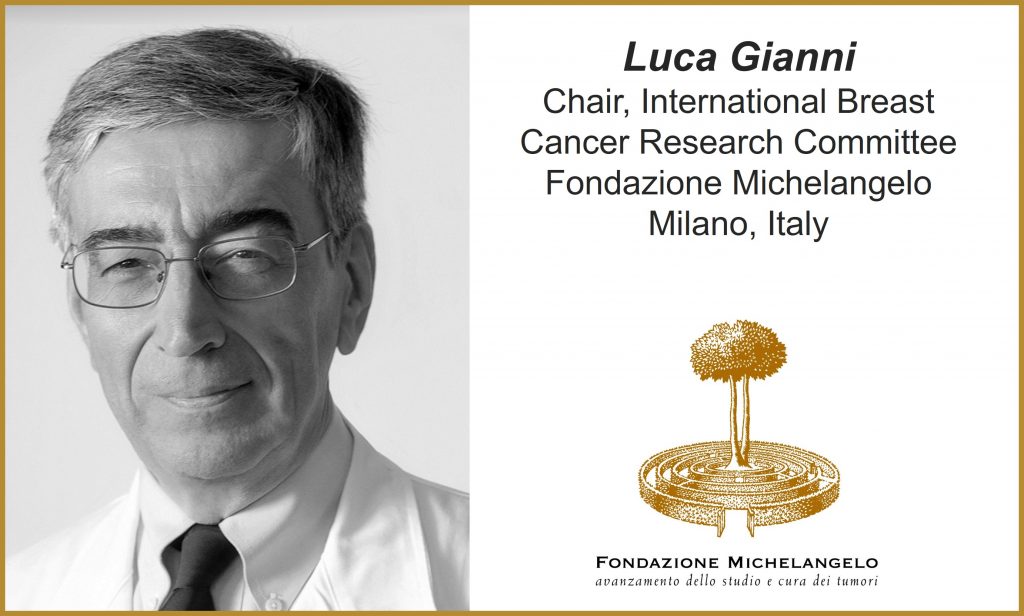New data from the NeoTRIP trial of Michelangelo Foundation recently presented during ESMO congress shows that in patients with operable triple negative breast cancer a neoadjuvant therapy with the anti-PD-L1 antibody atezolizumab added to chemotherapy did not significantly improve 5-years event-free survival. However, an exploratory analysis – using pathological complete response predictors from the same study and recently published in the journal Nature – suggests that a subset of cases with high density of CD8+ TCF1+ Ki67+ cells can derive benefit from atezolizumab.
The NeoTRIP trial promoted by Michelangelo’s Foundation is a phase III clinical trial to evaluate the effects of neoadjuvant therapy with an antibody against PDL-1 in patients with locally advanced triple-negative breast cancer undergoing treatment with nab-paclitaxel and carboplatin.
New data has been obtained on 280 patients randomized to neoadjuvant chemotherapy with or without atezolizumab for 8 cycles before surgery, to compare event-free survival, defined as disease progression while on primary therapy, disease recurrence after surgery or death due to any cause. Results show that at median follow-up of 54 months the 5-years event-free survival was 70.6% with atezolizumab and 74.9% without atezolizumab. PD-L1 expression and higher stromal tumor-infiltrating lymphocytes at baseline were prognostic for better event-free survival but not predictive of atezolizumab benefit. However, an ongoing extensive biomarkers analysis by imaging mass cytometry suggests that a subset of cases can derive benefit from atezolizumab: an exploratory analysis showed that high density of CD8+ TCF1+ Ki67+ activated immune cells is linked to increased event-free survival only in case of addition of atezolizumab. Moreover, a high density of CD8+ TCF1+ Ki67+ cells predicted a higher probability of pathologic complete response (78.4% with atezolizumab vs 31.8% without). Results of NeoTRIP trial should thus reinforce the search of widely applicable predictors of immune checkpoint inhibitor benefit in women with operable triple negative breast cancer.

New data from the NeoTRIP trial of Michelangelo Foundation recently presented during ESMO congress shows that in patients with operable triple negative breast cancer a neoadjuvant therapy with the anti-PD-L1 antibody atezolizumab added to chemotherapy did not significantly improve 5-years event-free survival. However, an exploratory analysis – using pathological complete response predictors from the same study and recently published in the journal Nature – suggests that a subset of cases with high density of CD8+ TCF1+ Ki67+ cells can derive benefit from atezolizumab.
The NeoTRIP trial promoted by Michelangelo’s Foundation is a phase III clinical trial to evaluate the effects of neoadjuvant therapy with an antibody against PDL-1 in patients with locally advanced triple-negative breast cancer undergoing treatment with nab-paclitaxel and carboplatin.
New data has been obtained on 280 patients randomized to neoadjuvant chemotherapy with or without atezolizumab for 8 cycles before surgery, to compare event-free survival, defined as disease progression while on primary therapy, disease recurrence after surgery or death due to any cause. Results show that at median follow-up of 54 months the 5-years event-free survival was 70.6% with atezolizumab and 74.9% without atezolizumab. PD-L1 expression and higher stromal tumor-infiltrating lymphocytes at baseline were prognostic for better event-free survival but not predictive of atezolizumab benefit. However, an ongoing extensive biomarkers analysis by imaging mass cytometry suggests that a subset of cases can derive benefit from atezolizumab: an exploratory analysis showed that high density of CD8+ TCF1+ Ki67+ activated immune cells is linked to increased event-free survival only in case of addition of atezolizumab. Moreover, a high density of CD8+ TCF1+ Ki67+ cells predicted a higher probability of pathologic complete response (78.4% with atezolizumab vs 31.8% without). Results of NeoTRIP trial should thus reinforce the search of widely applicable predictors of immune checkpoint inhibitor benefit in women with operable triple negative breast cancer.